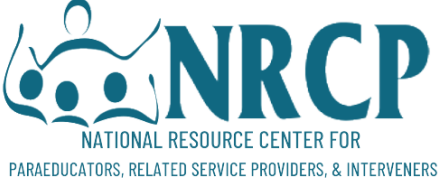The National Resource Center changed its name from “Paraprofessionals” to “Paraeducators” in 1989. Wondering why?
By Anna Lou Pickett, First Director and Founder, National Resource Center for Paraeducators
During the latter half of the 20th century several events took place that led to dramatic changes in our nation’s schools. To address critical shortages in the ranks of licensed teachers that began in the 1950s, a few schools began to employ “teacher aides” to assist teachers with non instructional tasks. This new group of school employees performed clerical tasks, monitored playgrounds, lunchrooms, and hallways, prepared bulletin boards, and carried out other activities designed to enable teachers to meet the educational needs of all students. At the same time, parents and other advocates joined forces to gain access to education and other community based services for children and youth with developmental disabilities as alternatives to state operated institutions. Parent operated schools employed teacher aides to enable teachers to provide personalized services for students who could benefit from additional support. The mid 1960s ushered in Title I, Head Start, and other compensatory programs designed for students from diverse language and cultural heritages, or educationally disadvantaged backgrounds. These new programs required “teacher aides” to perform more complex responsibilities in addition to their non-instructional tasks.
Over time, school districts adopted additional titles to more accurately describe teacher aid roles, responsibilities, and contributions. In the 1960s, several educators suggested the term “Para”, a Greek word meaning “alongside of”. The term “paraprofessional” recognized the functions that were being performed by “teacher aides”. This does not mean that districts stopped referring to this group of employees as “teacher aides”. Indeed there are numerous titles including: instructional, educational, or teacher assistant, occupational, physical therapy, speech-language aide, health care aide, job coach/transition trainer, intervener for learners who are deaf-blind. These are just a few of the titles for school personnel who work alongside teachers and other professional practitioners.
In 1989, Anna Lou Pickett, the founder and first director of the National Resource Center for Paraprofessionals suggested that the term “PARAEDUCATOR” be used to more accurately describe the nature of today’s “teacher aides”. Paraeducators support and assist teachers and other practitioners in various disciplines, just as their counterparts in law and medicine are designated as paralegals and paramedics.
We at the NRCP agree. Using a common term will enable us to more effectively achieve our goals. A common language will help us to develop strategies to gain the attention of policy makers, administrators, personnel developers, and other stakeholders with responsibilities for ensuring all educators including PARAEDUCATORS perform their assigned tasks to strengthen the performance of education teams. TASKS TO STRENGTHEN THE PERFORMANCE OF EDUCATION TEAMS.
